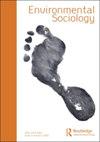农民身份:促进农业制度转型中的稳定和变化
IF 2.8
Q3 ENVIRONMENTAL STUDIES
引用次数: 4
摘要
摘要人为全球变暖带来的制度变革的必要性现在得到了充分认识,尤其是农业食品系统,它们既是气候变化的重要因素,又极易受到气候变化的影响。身份对制度变革的重要性在各个学术领域都得到了充分的认可,尽管在研究制度对气候变化的反应时,很少讨论这一关键驱动因素。在这项研究中,我们试图通过关注加拿大阿尔伯塔省农民样本的身份工作来创造这样做的空间,因为他们在这个行业不确定性的时刻游刃有余。我们展示了随着生产者试图适应日益增长的环境和气候问题,农民身份是如何变得不稳定的,许多生产主义农民试图转移身份不确认的来源,而后生产主义农民则积极参与社区建设和信息寻求支持新身份的形成。本文章由计算机程序翻译,如有差异,请以英文原文为准。
Farmer identities: facilitating stability and change in agricultural system transitions
ABSTRACT The need for institutional change posed by anthropogenic global warming is now well-recognized, and this is particularly the case for agri-food systems, which are both significant contributors to climate change, and highly vulnerable to its impacts. The importance of identity to institutional change is well-recognized in various areas of scholarship, although in the study of institutional responses to climate change this key driver is less often discussed. In this study, we seek to create space for doing so, by focusing on the identity work of a sample of farmers in Alberta, Canada, as they navigate this moment of sector uncertainty. We show how farmer identities are becoming destabilized as producers attempt to accommodate growing environmental and climatological concerns, with many productivist farmers seeking to deflect sources of identity disconfirmation, while post-productivist farmers engage in active community-building and information seeking to support the formation of a new identity.
求助全文
通过发布文献求助,成功后即可免费获取论文全文。
去求助
来源期刊

Environmental Sociology
ENVIRONMENTAL STUDIES-
CiteScore
4.60
自引率
12.00%
发文量
34
期刊介绍:
Environmental Sociology is dedicated to applying and advancing the sociological imagination in relation to a wide variety of environmental challenges, controversies and issues, at every level from the global to local, from ‘world culture’ to diverse local perspectives. As an international, peer-reviewed scholarly journal, Environmental Sociology aims to stretch the conceptual and theoretical boundaries of both environmental and mainstream sociology, to highlight the relevance of sociological research for environmental policy and management, to disseminate the results of sociological research, and to engage in productive dialogue and debate with other disciplines in the social, natural and ecological sciences. Contributions may utilize a variety of theoretical orientations including, but not restricted to: critical theory, cultural sociology, ecofeminism, ecological modernization, environmental justice, organizational sociology, political ecology, political economy, post-colonial studies, risk theory, social psychology, science and technology studies, globalization, world-systems analysis, and so on. Cross- and transdisciplinary contributions are welcome where they demonstrate a novel attempt to understand social-ecological relationships in a manner that engages with the core concerns of sociology in social relationships, institutions, practices and processes. All methodological approaches in the environmental social sciences – qualitative, quantitative, integrative, spatial, policy analysis, etc. – are welcomed. Environmental Sociology welcomes high-quality submissions from scholars around the world.
 求助内容:
求助内容: 应助结果提醒方式:
应助结果提醒方式:


